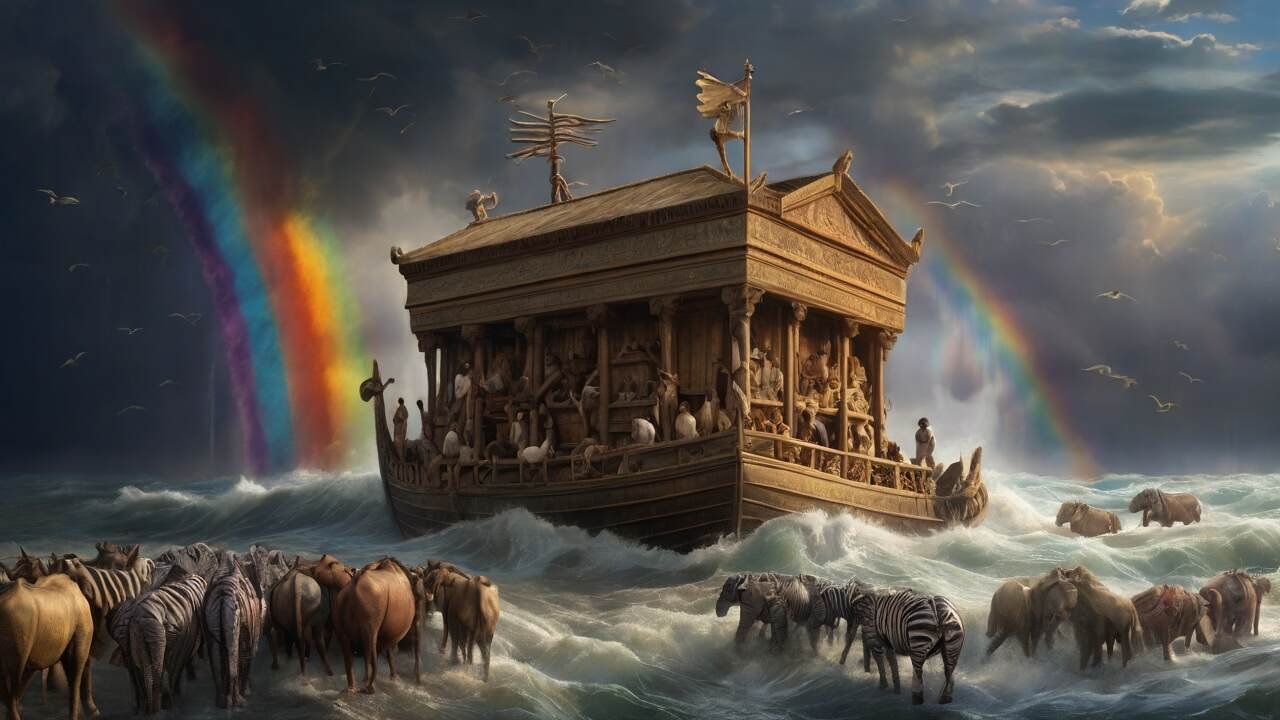In the rich tapestry of Christian belief, angels occupy a revered position as the messengers of the divine. These spiritual, non-corporeal beings are a fundamental truth of faith, as outlined in the Catechism of the Catholic Church.
Over the centuries, Christian theologians have devoted considerable effort to understanding the celestial hierarchy of angels and their roles in the cosmos. The most influential of these hierarchies is the Pseudo-Dionysian model proposed around the 6th century CE, which presents a structured approach to the various orders of angels.
By exploring the hierarchy of angels in Christian theology, we can gain valuable insights into the intricate and awe-inspiring realm of the divine. From the highest ranks of Seraphim and Cherubim to the more familiar Archangels and Guardian Angels, each order of angels fulfills a unique purpose in the grand tapestry of creation.
Understanding this celestial hierarchy not only deepens our appreciation for the complexity of Christian beliefs but also illuminates the profound role angels play in the spiritual lives of the faithful.
Key Takeaways
- Angels are considered the messengers of God in Christianity, with their existence as spiritual, non-corporeal beings a fundamental truth of faith.
- The Pseudo-Dionysian hierarchy is the most influential model of the celestial hierarchy of angels, consisting of three main spheres and nine distinct orders.
- Exploring the hierarchy of angels provides insight into Christian beliefs about the divine and the roles of angels in the cosmos.
- The highest-ranking angels, such as Seraphim and Cherubim, fulfill unique purposes within the divine hierarchy.
- Archangels and Guardian Angels are more familiar figures, playing significant roles in the spiritual lives of the faithful.
Introduction to Angels in Christian Beliefs
In Christian theology, angels are revered as spiritual, non-corporeal beings that serve as messengers of God. The Catechism of the Catholic Church affirms the existence of angels as a fundamental tenet of faith, stating that the entire life of the Church benefits from their mysterious and powerful assistance.
Definition and Role of Angels
Angels are described in Scripture as playing various crucial roles, such as delivering divine messages, guiding and protecting individuals, and worshipping God. They are considered to be celestial beings, endowed with intelligence and free will, existing to serve the purposes of the divine.
Scriptural References to Angels
The Bible is replete with references to angels, highlighting their pivotal presence in the lives of biblical figures. These include the angel’s appearance to the prophet Isaiah, the annunciation of the Virgin Mary by the angel Gabriel, and the angelic visitations experienced by the apostle Paul. These scriptural accounts underscore the profound impact angels have had on the faith and spiritual journeys of Christians throughout history.
| Key Scriptural References to Angels | Significance |
|---|---|
| Isaiah 6:1-7 | Angels appearing to the prophet Isaiah, proclaiming God’s holiness |
| Luke 1:26-38 | The angel Gabriel’s announcement of the virgin birth to Mary |
| Acts 27:23-24 | An angel appears to the apostle Paul, assuring him of God’s protection |
“For he will command his angels concerning you to guard you in all your ways.”
– Psalm 91:11
The Pseudo-Dionysian Angelic Hierarchy
The most influential Christian angelic hierarchy was proposed by Pseudo-Dionysius the Areopagite around the 6th century CE in his work “De Coelesti Hierarchia.” This Pseudo-Dionysian angelic hierarchy consists of three spheres, each containing three orders of angels. The first sphere includes the seraphim, cherubim, and thrones.
First Sphere: Seraphim, Cherubim, and Thrones
The seraphim are the closest to God, leading worship in heaven by singing endless praises. Depicted as fiery, six-winged beings, the seraphim are the highest-ranking angels in the hierarchy.
The cherubim are often portrayed as having multiple faces and wings, guarding the entrance to the Garden of Eden and the Ark of the Covenant. These angels are charged with the responsibility of protecting sacred spaces and divine knowledge.
The thrones, often described as wheels with many eyes, are responsible for dispensing God’s divine justice and maintaining cosmic harmony. These angels are closely associated with the throne of God and the administration of divine power.
“The seraphim are the highest-ranking angels, leading worship in heaven with their endless praises of God.”
Together, the seraphim, cherubim, and thrones form the first sphere of the Pseudo-Dionysian angelic hierarchy, serving as the most exalted and intimate companions of the divine.
Explore the Hierarchy of Angels in Christian Theology
In the intricate tapestry of Christian theology, the hierarchy of angels has long been a subject of profound fascination and scholarly exploration. While the Bible does not provide a definitive, step-by-step account of the celestial ranks, it does offer glimpses into the diverse roles and attributes of these divine messengers. Delving deeper into the proposed angelic hierarchies can shed light on the complexities of the spiritual realm and the vital functions angels serve in the cosmic order.
One of the most influential attempts to systematize the hierarchy of angels is the Pseudo-Dionysian model, which categorizes the celestial beings into three spheres, each comprising three distinct orders. This complex framework, rooted in the writings of the fourth-century philosopher Pseudo-Dionysius the Areopagite, has significantly shaped Christian theological understanding and sparked ongoing discussions among scholars and theologians.
- The First Sphere: Seraphim, Cherubim, and Thrones
- Seraphim: The highest order, believed to be the closest to the divine presence, characterized by their fiery nature and tireless worship of God.
- Cherubim: Renowned for their wisdom and knowledge, these angels are often depicted as guardians of the divine throne.
- Thrones: Considered the foundation of God’s sovereignty, these angels are associated with the administration of divine justice and the execution of divine will.
Although the Pseudo-Dionysian hierarchy represents a seminal framework, it is not the sole attempt to delineate the angelic ranks. Explore the hierarchy of angels in Christian theology to discover the nuances and complexities of these celestial beings, whose roles and responsibilities continue to captivate the imagination of believers and scholars alike.

“The angels are spiritual creatures created by God to serve Him and to guide, guard, and nurture His people.” – Billy Graham
By examining the angelic ranks and their celestial hierarchy, we gain a deeper appreciation for the divine order and the interconnectedness of the spiritual and physical realms in Christian theology. This exploration not only satisfies our intellectual curiosity but also inspires a sense of awe and reverence for the intricate workings of God’s creation.
Archangels and Guardian Angels
Within the Christian angelic hierarchy, archangels occupy a prominent position as powerful and influential messengers of God. The Bible specifically names three archangels: Michael, Gabriel, and Raphael. These archangels play distinct roles in the divine plan, each with their own unique purpose and significance.
Prominent Archangels: Michael, Gabriel, and Raphael
Michael is considered the leader of the angels and a warrior against evil forces. He is often depicted as a mighty and heroic figure, defending the faithful from the forces of darkness. Gabriel, on the other hand, is known for delivering important messages, such as the announcement of the births of John the Baptist and Jesus.
Raphael is associated with healing and guidance. He is believed to have helped the biblical figure Tobit by guiding him and curing his blindness. These three archangels are revered for their unwavering service to God and their role in shaping the course of Christian history.
The Concept of Guardian Angels
The concept of guardian angels, who are believed to protect and guide individual people, is also an important aspect of Christian angelology, though not explicitly mentioned in Scripture. These angelic beings are said to watch over and intercede on behalf of those in their care, offering spiritual support and protection throughout one’s life.
The belief in guardian angels has inspired countless works of art, literature, and devotion, reflecting the deep-rooted human desire for divine guidance and protection. While the specifics of their nature and duties may be debated, the idea of these celestial companions continues to captivate the imagination of the faithful.
“For he will command his angels concerning you to guard you in all your ways.”
– Psalm 91:11
Conclusion
The hierarchy of angels in Christian theology, as exemplified by the Pseudo-Dionysian model, offers a captivating and multilayered understanding of the divine realm. From the seraphim and cherubim closest to God, to the archangels and guardian angels who interact more directly with humanity, this celestial hierarchy reflects the diverse roles and responsibilities attributed to these spiritual beings. Exploring the Christian beliefs about angels provides insights into the perceived relationship between the divine and the earthly, as well as the intricate workings of the cosmos according to Christian tradition.
The summary of the angelic hierarchy in Christianity underscores the profound depth and complexity of this theological concept. By delving into the distinct ranks and functions of the various angelic orders, we gain a richer appreciation for the intricacies of the Christian worldview and the ways in which the divine is believed to interact with the mortal realm. This exploration invites us to ponder the nature of the spiritual realm and the role of these celestial beings in the grand scheme of Christian cosmology.
Ultimately, the conclusion on the hierarchy of angels in Christian theology highlights the enduring significance of this concept within the broader context of Christian beliefs and teachings. It serves as a testament to the depth and nuance of the Christian tradition, and invites further contemplation and reflection on the multifaceted relationship between the divine and the human experience.
FAQ
What is the hierarchy of angels in Christian theology?
The most influential Christian angelic hierarchy was proposed by Pseudo-Dionysius the Areopagite around the 6th century CE. It consists of three spheres, each containing three orders of angels: the seraphim, cherubim, and thrones in the first sphere; the dominions, virtues, and powers in the second sphere; and the principalities, archangels, and angels in the third sphere.
What are the roles and characteristics of the different orders of angels?
The seraphim are the closest to God, leading worship in heaven by singing endless praises. The cherubim are depicted as having multiple faces and wings, guarding the entrance to the Garden of Eden and the Ark of the Covenant. The thrones are responsible for dispensing God’s divine justice and maintaining cosmic harmony. The dominions, virtues, and powers are believed to have various administrative and spiritual responsibilities. The principalities, archangels, and angels interact more directly with humanity, delivering divine messages and guiding or protecting people.
Who are the prominent archangels mentioned in Christian theology?
The Bible specifically names three archangels: Michael, Gabriel, and Raphael. Michael is considered the leader of the angels and a warrior against evil forces, while Gabriel is known for delivering important messages, such as the announcement of the births of John the Baptist and Jesus. Raphael is associated with healing and guidance.
What is the concept of guardian angels in Christianity?
The concept of guardian angels, who are believed to protect and guide individual people, is an important aspect of Christian angelology, though not explicitly mentioned in Scripture. These angels are believed to have a special relationship with the individuals they are assigned to watch over and guide.








